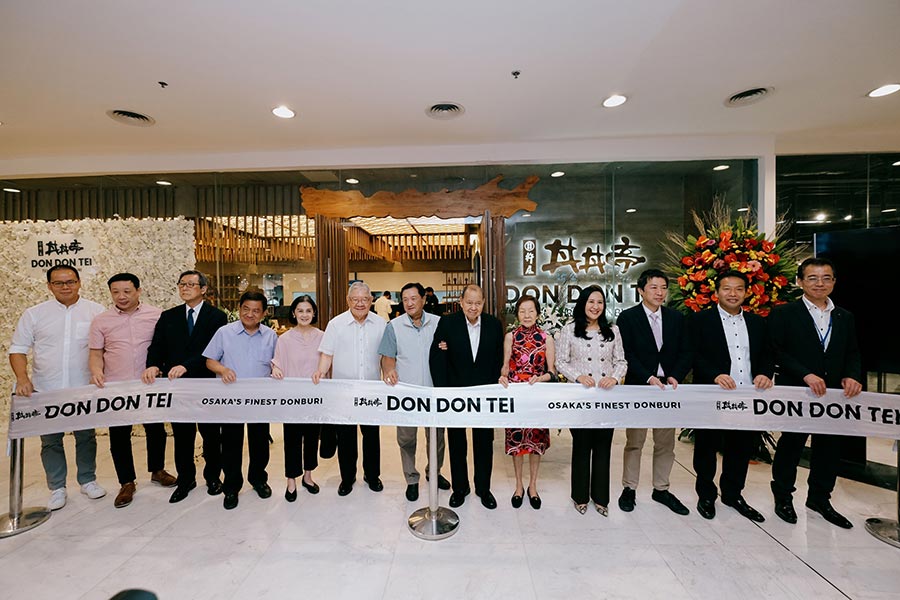This March, the Philippines welcomes a new name in the culinary scene promising an authentic Japanese dining experience.
Don Don Tei, a rice bowl specialized restaurant from vibrant Osaka, Japan, is opening its first restaurant in Manila at the second level of Robinsons Galleria (ADB Wing). Don Don Tei brings Japanese tradition to the local palate with an affordable menu offering a variety of tasty and convenient dishes.
“The arrival of Don Don Tei (also known as Kineya Don Don Tei) in the Philippines furthers Gourmet Kineya’s dedication to sharing the joy of simple, delicious, and affordable meals with the world,” said Hideto Nishijima, managing director of Business Strategy and Planning, speaking on behalf of Gourmet Kineya chief executive officer Atsushi Mukumoto.
“As we prepare to welcome our diners in Robinsons Galleria, we promise a dining experience that combines the best of Japanese tradition and flavors that Filipino foodies will keep coming back to. And with Filipinos’ love for Japanese food, we are already looking forward to opening in more locations soon,” added Nishijima.
At the heart of Don Don Tei’s menu is Donburi, a beloved Japanese comfort food. These rice bowls are topped with a variety of ingredients, ranging from beef and pork to fish and chicken, each cooked in unique sauces that highlight the essence of Japanese cuisine.
Experience the crunch of their Tempura Specials from their Special Ebi Tendon with Black Tiger Prawns, Ebi Tendon, to the must-try Kakiage Ebi Tendon.
Indulge in their Beef Selections with the savory flavors of Gyudon, Wagyu Yakiniku Don, and Sukiyaki Jyu. Savor the richness of Katsudon, Tonkatsu Don, Katsu Curry, and other Pork Delights. Those who prefer seafood will enjoy their Fish Selections such as Unajyu, Grilled Mackerel, and Salmon Teriyaki. Or feast on their selection of Chicken rice bowls: Oyakodon, Chicken Karaage Don, Chicken Teriyaki Don, and Chicken Karaage Curry.
“At Don Don Tei, we’re not just serving food; we’re delivering an experience. Every donburi ordered comes with miso soup, offering our guests a taste of Japanese hospitality. For those seeking a more comprehensive dining experience, we offer the option to upgrade their donburi to a Teishoku version, which comes with an ensemble of side dishes including potato salad, green beans and carrots kobachi, and Tsubozuke pickles,” Nishijima said.
Adding to the diverse menu, Don Don Tei highlights Soba, utilizing buckwheat noodles known for their health benefits, including high levels of antioxidants and nutrients. Diners can choose between hot and cold Soba or the hearty Niku Soba. This soba has noodles in Kake Dashi broth with beef slices, organic egg yolk, and spring onion that gives the umami flavor, bringing together a unique taste and texture experience.
Don Don Tei also introduces an array of citrus drinks from the Yuzu series, allowing customers to choose among flavors like Peach, Raspberry, Rose Lemonade, and Ginger Beer, providing a refreshing complement to any meal.
Following the recipes and proprietary sauces of its Japanese counterpart, Don Don Tei Philippines ensures an authentic taste experience that closely mirrors the original flavors loved by many in Japan.
Don Don Tei, which translates to “Rice Bowl House,” made its debut in Abeno, Osaka, in November 1988. Starting with a modest 14-seat bar, it has since grown into a beloved chain with a presence in Hong Kong, the United States, and now, the Philippines. The restaurant is celebrated for its wide selection of donburi, making it a go-to spot for those craving Osaka’s finest rice bowls.
Marissa So, executive vice president of Oishi Gourmet Foods Inc., the company that franchised Don Don Tei, further revealed that the team at Don Don Tei, from the kitchen to the service staff, has undergone rigorous training with Japanese experts. “The high-quality ingredients, from the sauces to the meats, and even the presentation of every bowl, have been strictly supervised to meet the company’s high standards. This commitment ensures that each dish served not only is authentic but also represents the meticulous care and attention to detail that Japanese cuisine is known for.”





